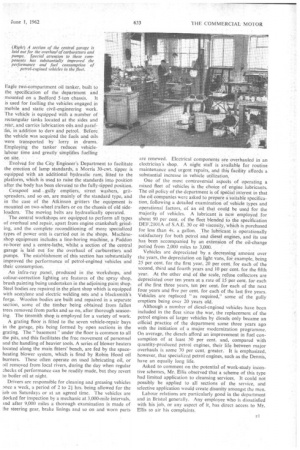Eagle two-compartment oil tanker, built to the specification of the
Page 75

If you've noticed an error in this article please click here to report it so we can fix it.
department and mounted on a Bedford 5-ton chassis. It is used for fuelling the vehicles engaged in mobile. and static civil-engineering work. The vehicle is equipped with a-number of rectangular tanks located at the sides and rear, and carries lubrication oils and .paraffin, in addition to dery and petrol. -Before the vehicle was acquired the fuels and oils
• were transported by lorry in drurris. Employing the tanker . reduces vehiclelabour time and greatly simplifies fuelling Oil site. , Evolved for the City Engineer's Department to facilitate the erection of lamp standards, a Morris 30 cwt tipper is equipped with an additional hydraulic ram, fitted to the platform, which is used to raise the standards into position after the body has been elevated to the fully-tipped position.
Cesspool and _gully emptiers, street washers, gritspreaders, and so on, are mainly of the standard type, and in the case of the Atkinson gritters the equipment is mounted on two-wheel trailers or on the chassis of old sideloaders. The moving belts are hydraulically operated.
The central workshops are equipped to. Perform all types of overhaul and repair, apart from engine crankshaft grinding, and the complete reconditioning of more specialized types of power unit is carried out in the shops. Machineshop equipment includes a line boring machine, a Paddon re borer and a centre lathe whilst a section of the central garage is laid out for the overhaul of carburetters and pumps. The establishment of this section has substantially improved the performance of petrol-engined vehicles and their. consumption.
An infra-ray panel, produced in the workshops, and colour-correction lighting are features of the spray shop, brush painting being undertaken in the adjoining paint shop. Steel bodies are repaired in the plant shop which is equipped with acetylene and electric welding sets and a blacksmith's forge. Wooden bodies are built and repaired in a separate section, some of the timber being obtained from fallen trees removed from parks and so on, after thorough seasoning. The tinsmith shop_ is employed for a variety of work.
A grating floor is fitted to the seven vehicle-repair bays in the garage, pits being formed by open sections in the grating. The " basement " under the floor is common to all the pits, and this facilitates the free movement of personnel and the handling of heavier tools. A series of blower heaters located along the main fitters' bench, are fed by the spaceheating blower system, which is fired by Robin Hood oil burners. These often operate on used lubricating oil, or oil removed from local rivers, during the day when regular Alecks of performance can be readily made, but they revert to boiler oil at night.
Drivers are responsible for cleaning and greasing vehicles once a week, a period of 2 to 21 hrs. being allowed for the iob on Saturdays or at an agreed time. The vehicles are docked for inspection by a mechanic at 3,000-mile intervals, and after 9,000 miles a thorough examination is made of the steering gear, brake linings and so on and worn parts
are renewed. Electrical components are overhauled in an electrician's shop. A night staff is available for routine maintenance and urgent repairs, and this facility affords a substantial increase in vehicle utilization: One of the most controversial aspects of operating a mixed fleet of vehicles is the choice of engine lubricants. The oil policy of the department is of special interest in that the oil companies were asked to prepare a suitable specification, following a detailed examination of vehicle types and operational factors, of an oil that could be used for the majority of vehicles. A lubricant is now -employed for about 90 per cent of the fleet blended to the specification DEF.2101A of S.A.E. 30 or 40 viscosity, which is purchased for less than 4s. a gallon. The lubricant is operationally satisfactory for both petrol and diesel engines,and its use has been -accompanied by an extension of the oil-change
period from 2,000 miles to 3,000.
Vehicles are depreciated by a decreasing amount over the years, the depreciation on light vans, for example, being 25 per cent. for the first year, 20 per cent. for each of the second, third and fourth years and 10 per cent. for the fifth year. At the other end of the scale, refuse collectors are depreciated over ten years at a rate of 15 per cent. for each of the first three years, ten per cent. for each of the next four years and five per cent. for each of the last five years. Vehicles are replaced "as required," some of the gully emptiers being over 20 years old.
Although a number of diesel-engined vehicles have been included in the fleet since the war, the replacement of the petrol engines of larger vehicles by diesels only became an official practice of the department some three years ago with the initiation of a major modernization programme. On average, the diesels afford an improvement in fuel consumption of at least 50 per cent. and, compared with quantity-produced petrol engines, their life between major overhauls is some 70 per cent. greater. It is emphasized, however, that specialized petrol engines, such as the Dennis, have an equally long life.
Asked to comment on the potential of work-study incentive schemes, Mr. Ellis observed-that a scheme of this type had limited application to cleansing services. It could not possibly be applied to all sections of the service, and selective application would create disunity amongst the men.
Labour relations are particularly good in the department and in Bristol generally. Any employee who is dissatisfied with his job, or any aspect of it, has direct access to Mr. Ellis to air his complaints.






































































































































































